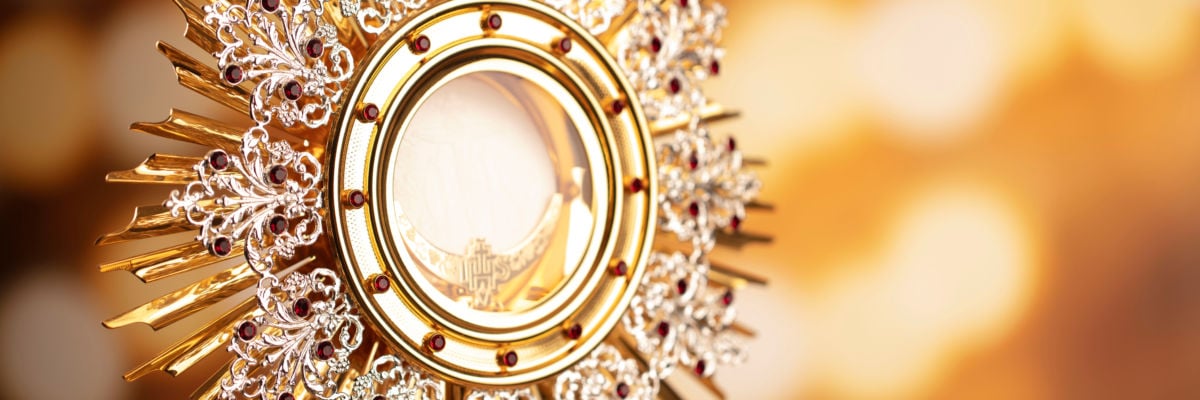
If you listen to Catholics discussing the Blessed Sacrament today, you’re likely to hear—not just, but especially in traditional circles—an emphasis on the Eucharist as “sacrifice” and a complaint about overemphasis on the Eucharist as a “meal.”
Maybe you’ve wondered: what are they talking about?
Well, discussion of the Eucharist as sacrifice is certainly no novelty. In fact, it’s probably how most Catholics predominantly discussed the sacrament, certainly until not too long ago.
But sacrifice? We’re in the twenty-first century, remember?
Okay, but that doesn’t make the Eucharist any less real as a sacrifice.
In the ancient world, including the times described in the Old Testament, sacrifice was the way one sealed a covenant. A covenant was not just a “contract” or an “agreement.” It was a life commitment between two parties. To enter a covenant was to undertake a most solemn obligation on which the parties staked their lives. You’ve heard the expression “cross my heart and hope to die”? That child’s phrase today expresses something of the gravity of the commitment two parties that bound themselves to each other made.
Covenants were brought into being with blood because, for most human beings in antiquity, blood was the seat of life. If your blood was spilled, you were weak. If spilled too much, you were dead. That is why animals were offered in sacrifice: their blood was supposed to represent the human covenant-makers.
Covenants could be between equals, but they usually were between unequals, between a superior and a subordinate. A defeated king who now became a vassal to his conquerer was bound by covenant.
And when God made covenants—with Abraham, with Moses, with Israel—those were most definitely covenants between unequals.
Covenant partners bound themselves by their lives to do (or not do) something vis-à-vis the other. A vassal bound himself not to be disloyal to his king and to defend him. Israel bound itself to keep God’s Law, and God bound himself to be their God and they his people.
God’s first covenant is creation: God bound himself to man in a special way by creating him in “his image and likeness.” Man broke that covenant by wanting to be not God’s image and likeness, but rather “like God” himself, deciding for himself what is good and what is evil. Israel broke God’s covenant by its constant religious backsliding.
“Again and again you offered a covenant to man and . . . taught him to hope for salvation.”
The final and definitive covenant, “the new and everlasting covenant,” is made with God in Christ. It is made with his blood, “not the blood of bulls and goats” (Heb. 9: 13-14), but of a human being who, at the same time, was God. As man he offered himself absolutely to God; as God, his offering is absolutely perfect. Jesus did what we could not but needed to do. He offered himself on the Cross, unto death.
But what does this have to do with the Eucharist?
Jesus explicitly speaks of the Eucharist as his body and his blood. They do not “represent” or “symbolize” his body and blood; they are his body and blood, “the blood of the new and everlasting covenant, shed for you and for many for the forgiveness of sins.” That act of Jesus’s absolute submission to his Father’s will, even unto death, is re-presented in every Mass.
Jesus clearly intended the Eucharist to be part of his offering on the cross. Catholic theology speaks of the Eucharist as making the “sacrifice of Christ present.”
But Jesus instituted the Eucharist on Holy Thursday night, and he didn’t die until Good Friday afternoon. So how are they connected?
Let’s remember that, for God, time is not past, present, and future. Jesus is not sitting at God’s right hand, waiting to see how history will turn out. “All time belongs to him,” we say during the inscription of the paschal candle at the Easter vigil. For us, mortal creatures, time is experienced as unfolding: past, present, and future. For God, all time is now.
So, yes, Jesus offered himself once and for all (a prime Protestant contention that also corresponds to Heb. 10:10). But Jesus’ offering encompassed his passion, death, and resurrection on Calvary that was already anticipated in the Last Supper and is made present in every Eucharist that has been celebrated from then until the end of time. This is Jesus offering himself.
Jesus enjoined his apostles to “do this in memory of me”—not as an afterthought, not as a “hey, Jesus did this, and isn’t it nice?” No, “memory” here in a Jewish context has a specific meaning. It is a making present of the thing being remembered here and now.
The Last Supper was a Passover meal. The Passover prefigures the Eucharist. When God institutes the Passover, he instructs Moses that Israel is to keep this “memorial” forever (Exod. 12:14) because every generation of Jews stands together with Moses and Aaron and the Jews of Egypt with whom God made this covenant. Even today, during the Passover meal, the youngest child asks, “Why is this night different from all others?” Take note of the verb and adjective: the child does not ask “why was that night different,” but “why is this night different?” Before Almighty God, every Jew who was, is, or will be was part of that Passover.
And if the Passover merely prefigures the sacrificial offering of the Lamb of God, the real offering on Calvary presupposes just as real a memory: whoever belongs to Christ is joined, in every Eucharist, to the Upper Room and Calvary. If by baptism we become part of Jesus’ death (Rom. 6:31-11), well, baptism makes us participants in that death in order to make us part of the mystical body of Christ.
So is the Eucharist a meal? Yes, but a unique kind of meal, because it is also a sacrifice, thanks to which (and thanks only to which) we are saved.
By taking part in and receiving the Eucharist, we—the mystical body of Christ—join the supreme offering of our head to God. That is why we speak of the priest as celebrating in persona Christi. It’s not “Father John’s Mass.” It’s Christ’s Mass, who acts through human ministers to accommodate us, mortal creatures bound to space and time, raising us up to God’s dimension not bound by such limits.
(To read more on the Eucharist as sacrifice, see the Catechism of the Catholic Church, 1362-72.)



